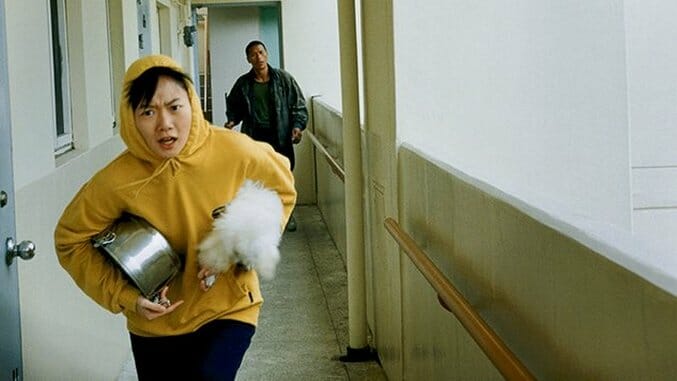Square One: Bong Joon-ho’s Barking Dogs Never Bite (2000)

Whenever a filmmaker of note premieres a new film, it’s a good time to revisit that director’s first film to gauge how far they’ve come as an artist. With Okja now on Netflix, we take a look back at Bong Joon-ho’s Barking Dogs Never Bite.
Humor and horror are intimate bedfellows in the films of Bong Joon-ho, the South Korean New Waver whose dark-light, heavy-yet-hilarious genre mélanges rank among the most exciting films this young century has seen thus far. And yet, while the adrenalizing experience of rollercoastering from sunshine to abyss is pleasurable in and of itself, the tonal dissonance of Bong’s pictures also evokes, complements and often stems directly from one of the director’s recurring thematic obsessions: the absurd fight of individuals against bastions of evil—be it cruel indifference or otherworldly terror, whether they be a radioactive monster in the Han River, an outdated law enforcement bureaucracy or class division itself as embodied by a futuristic train whose compartments horizontally stratify the passengers based on socioeconomic class.
Comedy in a Bong picture, which typically oscillates between deadpan and slapstick, is almost always tinged with the pathos of futility, of plans gone awry and the bizarre, often nightmarish situations in which one finds oneself despite honest attempts to be somewhere, anywhere, else.
In Bong’s debut film, 2000’s Barking Dogs Never Bite, Yun-ju (Sung-jae Lee) certainly wants to be somewhere else. (If possible, he might even opt for another life.) A self-doubting grad student whose prospects of becoming a professor hinge upon his ability to bribe the dean with money he doesn’t have, Yun-ju is at the end of his rope. It hardly helps that his wife bosses him around constantly, treatment he’s helpless to protest, not only because she’s more headstrong than him but because she’s the one paying the bills.
All this we find out gradually as the film unfolds, because when the movie begins, all we know about is the straw that’s breaking the camel’s back: incessant yapping from an unseen dog hidden somewhere within the apartment complex in which Yun-ju lives. In this opening scene, the barking goes on and on, getting into his head and ours. The dog has nothing to do with Yun-ju’s main troubles, except it’s also got everything to do with them—it’s a creature that is both a literal nuisance and a metaphor for the itch Yun-ju can’t scratch, the fulfilment he can’t find.
-

-

-

-

-

-

-

-

-

-

-

-

-

-

-

-

-

-

-

-

-

-

-

-

-

-

-

-

-

-

-

-

-

-

-

-

-

-

-

-








































